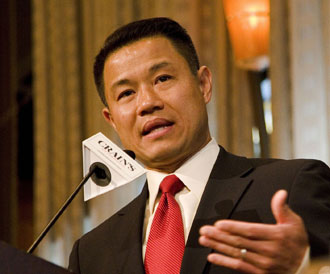The news that a top aide will be subpoenaed to testify hasn’t dampened the eagerness of New York City comptroller John Liu to get underway the trial on charges that two associates had used straw donors to funnel money into the successful 2009 campaign for his current post.
“It’s a beautiful day, and the trial is starting,” said Liu Monday, the scheduled opening day of the trial. “I think we’ve all been looking forward to it. I’m glad it’s not been delayed any more. The more information that comes out, the better it will be for these two people, for the public at large and my campaign.”
The two defendants in the trial in Manhattan’s Federal District Court are Jia (Jenny) Hou, Liu’s former campaign treasurer, and Xing Wu Pan, a key former fundraiser within New York’s Asian American community. They are charged with conspiring to use straw donors to evade campaign contribution limits. There are no allegations of wrongdoing by Liu himself though he was targeted in a three-year probe that involved wiretaps on thousands of phone conversations.
Another key target in the FBI probe against whom no charges have been filed is Sharon Lee who remains one of Liu’s most important aides. Prosecutors told the judge Monday that they expect to call her as a hostile witness in the trial against Hou and Pan. They have alleged that Lee too had sought to turn family members and friends into straw donors by offering to reimburse them for contributions to the 2009 Liu campaign. Prosecutors hope to link the efforts of all three Liu associates “to prove the existence of a coordinated effort on the part of campaign insiders to funnel money into the campaign through straw donors and thereby defraud New York City of matching funds.”
The judge apparently overruled the objection of one of Hou’s defense lawyers that no evidence suggests any coordination between the activities of Lee and Hou. In ordering Lee to testify the judge offered her immunity from prosecution. Lee’s lawyer declined the offer of immunity on his client’s behalf, implying that his client had done nothing that could be the subject of criminal prosecution.
It’s likely prosecutors had initially tried to offer Lee immunity in exchange for helpful testimony but that Lee had declined the deal on the ground that she had committed no prosecutable offense. Such offers by prosecutors are excluded from evidence to prevent the jury from drawing any prejudicial inferences.
The trial opened Monday with jury selection which is expected to continue through Tuesday. Among prospective jurors excused during the morning session included a man who had seen Liu on TV and developed a negative impression of him.
“I didn’t like the way he deflected the questions that were asked of him,” said the man.
Another prospective juror who owned a printing business downtown said he had run into Liu a couple of times and had a “very favorable” impression, saying he didn’t believe Liu “wouldn’t tolerate whatever this case was about.” He too was excused.
Liu is one of ten candidates seeking to replace outgoing three-term mayor Michael Bloomberg. Currently he is polling fourth among seven Democratic candidates, with only about a third of the campaign contributions and a quarter of the support of frontrunner Christine Quinn, the current city council speaker.
Despite the cloud of the current trial Liu is likely to emerge as one of the frontrunners by mid-September when the Democratic primary will be held. In the 2009 comptroller’s race he polled 19% support just two weeks before the primary but ended up with 38% of the vote. He handily won the September 29 runoff against David Yassky with the support of a rainbow coalition comprising virtually every ethnic group, including the Irish and the Russian communities.
The extra media attention the trial is likely to give Liu during the next several weeks may be just the thing his campaign needs to focus attention on his populist crusade to raise an extra $15 billion in revenues over the next four years, largely by taxing the city’s rich. The additional money would fund the kinds of services the city’s working-class voters are likely to favor: 5,000 new police officers, year-round preschool for 100,000 3-year-olds, 7-days-a-week library hours, housing vouchers for homeless families, free monthly MetroCards to CUNY students on financial aid, and a tax cut for most New Yorkers.


